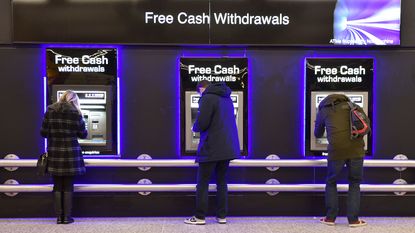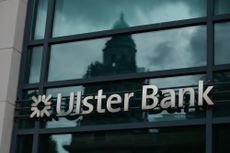Negative interest rates and the end of free bank accounts
Negative interest rates are likely to mean the introduction of fees for current accounts and other banking products. But that might make the UK banking system slightly less awful, says Merryn Somerset Webb.


The weekend papers were full of worry about negative interest rates coming to the UK. This isn’t a given (the implications for the banking sector aren’t good). But it is more likely than it was a few months ago, given that the Bank of England is clearly looking not just at the academic case for them but also the practicalities of introducing them (computer systems are only designed to deal with positive rates).
You can hear what John and I think about all this on the latest MoneyWeek Podcast (clue: not much) and in John’s Money Morning on the subject (if you don’t get our brilliant daily newsletter, sign up here).
Most commentators, one column in the Observer aside, seem to share our concern about the long term effects of turning the concept of money upside down. Former Barclays chairman John McFarlane summed it up in quotes in the Telegraph: negative rates, he said, risk causing a “massive dislocation” in markets. An editorial in the Times notes that it would “have damaging side effects that would take a long time to heal.” That might be fine, if there was any real evidence that they would achieve the main aim – stimulating the economy. There isn’t. “Whether they achieve the desired effect of stimulating demand and inflation, is debatable.”
Subscribe to MoneyWeek
Subscribe to MoneyWeek today and get your first six magazine issues absolutely FREE

Sign up to Money Morning
Don't miss the latest investment and personal finances news, market analysis, plus money-saving tips with our free twice-daily newsletter
Don't miss the latest investment and personal finances news, market analysis, plus money-saving tips with our free twice-daily newsletter
Still, in our world of something-must-be-done-ism, just because there is no evidence a controversial and disruptive policy works does not mean it won’t be introduced anyway. So what will negative rates really mean for you in the immediate?
The key thing here is that the UK’s banks will be being charged for having cash deposited at the central bank. They will be paying negative interest rates – and they’ll need to finance that by charging someone else to cover it. In theory, that someone else could be you – you could end up paying for the privilege of having cash in the bank. In reality, that is not particularly likely; it hasn’t happened in other places where negative interest rates have been introduced. Instead, negative rates are likely to be charged on very large balances only (mostly corporate and perhaps the odd very large retail account).
The thing the rest of us have to look out for is the introduction of negative rates as the trigger for the imposition of banking fees in the UK. The UK’s banks have been skirting around this issue for years. The fact that no obvious fees are charged on retail banking accounts does not of course mean that these accounts are actually free (the difference is made up with overdraft charges and the paying of no interest on current accounts). They do however – from the customer’s point of view – feel free. So what will change?
The CEO of Virgin Money offered some suggestions in the Daily Mail this week. He expects banks to “make slow and incremental” changes over the next few years to test exactly what we are prepared to pay for. It could mean upping rates on credit cards, mortgages and foreign exchange (I’m afraid no one is going to get paid for having a mortgage). Or it could mean paying for obvious services – fees for replacement debit cards, for example (something Monzo and Starling are already experimenting with). Eventually, it should mean that most accounts are fee paying. Negative interest rates are not the catalyst I would have chosen for this. But fee paying accounts are not necessarily a bad thing – after all, it does cost something to provide them.
The UK retail banking system has long been awful – shot through with hideously untransparent charges designed to catch the unwary, admin phobic and overdrawn out. The result has been an oddly unprogressive system whereby the poor pay, the well off often do not, and scandals appear with worrying regularity (PPI etc). It makes no sense. The introduction of low flat fees across the system might not make the banks perfect (decades of devotion to low-level dirty dealings will be hard to shake off) but they might at least change the dynamic that has been such a big contributor to their failures over the years.
Merryn Somerset Webb started her career in Tokyo at public broadcaster NHK before becoming a Japanese equity broker at what was then Warburgs. She went on to work at SBC and UBS without moving from her desk in Kamiyacho (it was the age of mergers).
After five years in Japan she returned to work in the UK at Paribas. This soon became BNP Paribas. Again, no desk move was required. On leaving the City, Merryn helped The Week magazine with its City pages before becoming the launch editor of MoneyWeek in 2000 and taking on columns first in the Sunday Times and then in 2009 in the Financial Times
Twenty years on, MoneyWeek is the best-selling financial magazine in the UK. Merryn was its Editor in Chief until 2022. She is now a senior columnist at Bloomberg and host of the Merryn Talks Money podcast - but still writes for Moneyweek monthly.
Merryn is also is a non executive director of two investment trusts – BlackRock Throgmorton, and the Murray Income Investment Trust.
-
 The industry at the heart of global technology
The industry at the heart of global technologyThe semiconductor industry powers key trends such as artificial intelligence, says Rupert Hargreaves
By Rupert Hargreaves Published
-
 What are shareholder voting rights and why do they matter?
What are shareholder voting rights and why do they matter?If you hold shares in a company, the chances are they’ll come with voting rights. But how do you exercise your right to vote? And is your fund manager taking it seriously?
By Katie Williams Published
-
 Act now to bag NatWest-owned Ulster Bank's 5.2% easy access savings account
Act now to bag NatWest-owned Ulster Bank's 5.2% easy access savings accountUlster Bank is offering savers the chance to earn 5.2% on their cash savings, but you need to act fast as easy access rates are falling. We have all the details
By Marc Shoffman Last updated
-
 Moneybox raises market-leading cash ISA to 5%
Moneybox raises market-leading cash ISA to 5%Savings and investing app MoneyBox has boosted the rate on its cash ISA again, hiking it from 4.75% to 5% making it one of top rates. We have all the details.
By Ruth Emery Published
-
 October NS&I Premium Bonds winners - check now to see what you won
October NS&I Premium Bonds winners - check now to see what you wonNS&I Premium Bonds holders can check now to see if they have won a prize this month. We explain how to check your premium bonds
By Kalpana Fitzpatrick Published
-
 October’s NS&I Premium Bond winners revealed - have you scooped £1 million?
October’s NS&I Premium Bond winners revealed - have you scooped £1 million?Two lucky NS&I Premium Bond winners are now millionaires this October. Find out here you are one of them
By Kalpana Fitzpatrick Published
-
 The best packaged bank accounts
The best packaged bank accountsAdvice Packaged bank accounts can offer great value with useful additional perks – but get it wrong and you could be out of pocket
By Tom Higgins Last updated
-
 Bank of Baroda closes doors to UK retail banking
Bank of Baroda closes doors to UK retail bankingAfter almost 70 years of operating in the UK, one of India’s largest bank is shutting up shop in the UK retail banking market. We explain everything you need to know if you have savings or a current account with Bank of Baroda
By Vaishali Varu Published
-
 The best options to earn cashback on spending
The best options to earn cashback on spendingFrom credit cards and current accounts to cashback websites, there are plenty of ways to earn cashback on the money you spend.
By John Fitzsimons Published
-
 Should you retire abroad?
Should you retire abroad?Check the regulations governing pension savings carefully before you decide to retire abroad.
By David Prosser Published